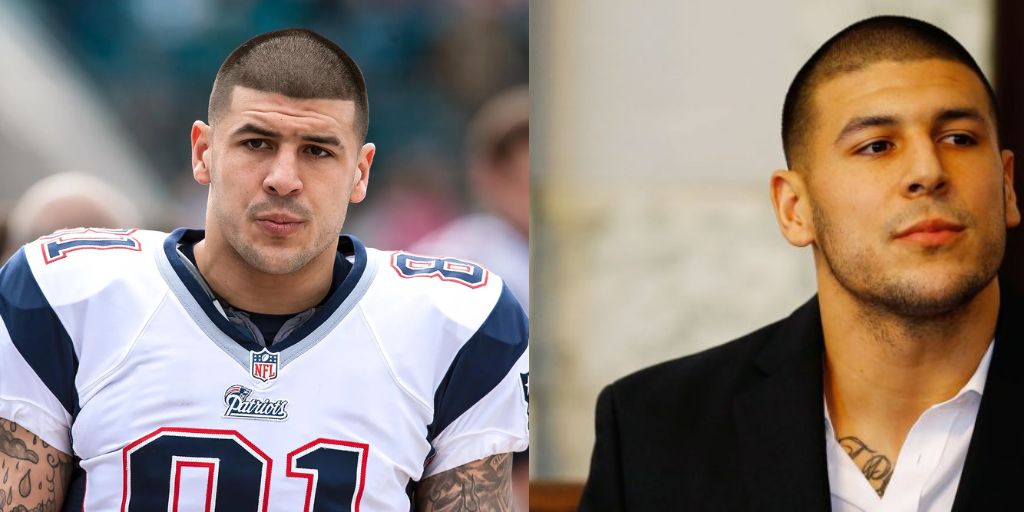Ryan Murphy is renowned for bringing compelling, real-life stories to the screen. His American Crime Story series has previously tackled significant events such as the O.J. Simpson trial, the murder of Gianni Versace, and President Bill Clinton’s impeachment.
Each of these seasons has featured intriguing scripts that show the behind-the-scenes details of these high-profile cases.
The series has been well-received, with exceptional performances by actors like Courtney B. Vance, Sarah Paulson, Sterling K. Brown, and Darren Criss, who have earned numerous awards, including Emmys. Murphy’s ability to blend fact with dramatic storytelling has made his shows notable.
Now, Ryan Murphy is shifting his focus to the world of sports with his new series, American Sports Story: Aaron Hernandez.
This series, which will premiere on FX on September 17, goes into the life of Aaron Hernandez, a former NFL player whose career ended in scandal and tragedy. The show will provide viewers with an in-depth look at Hernandez’s rise to fame, his fall from grace, and the complex circumstances surrounding his life and death.
The Rise of Aaron Hernandez
Aaron Hernandez’s story begins with a promising start. Born in Bristol, Connecticut, Hernandez began playing football as a young child. His love for the game grew as he continued to excel on the field.
Despite facing several challenges during his youth, including legal troubles and a difficult family life, Hernandez made his way to the University of Florida.
There, he quickly became known for his exceptional talent as a tight end. His impressive performances caught the attention of NFL scouts.
In 2010, Hernandez was drafted into the NFL by the New England Patriots. His debut was highly anticipated, and he made a significant impact, including an appearance in Super Bowl XLVI. However, his career was marred by various controversies.
Hernandez was known for drug use and was rumored to be involved in several violent incidents.
Despite these issues, in August 2012, the Patriots extended Hernandez’s contract for five years, worth $39.58 million, with a $12.5 million signing bonus—the largest ever given to an NFL tight end at that time. Hernandez seemed to have a bright future ahead of him. But his life was about to take a dramatic turn.
Aaron Hernandez’s Dramatic Fall from Grace
On June 26, 2013, Aaron Hernandez’s life changed forever. He was charged with first-degree murder and faced five additional gun charges. The Patriots wasted no time in releasing him from the team, bringing his football career to an abrupt end.

The murder charges were connected to the death of Hernandez’s friend, Odin Lloyd. Lloyd’s body was discovered in a field near Hernandez’s home, and the circumstances surrounding his death were both shocking and mysterious.
At the beginning of the case, the motive for the murder was unclear. Hernandez pleaded not guilty, and his defense team attempted to shift the blame to two other men who were present at the scene. Despite their efforts, there was substantial physical evidence linking Hernandez to the crime.
The jury deliberated for seven days before returning with a guilty verdict, resulting in a mandatory life sentence without the possibility of parole. Hernandez’s promising future was effectively over, and he faced a lifetime behind bars.
The Mysterious Link to Other Crimes
As investigators continued to probe Lloyd’s murder, they uncovered additional troubling evidence. Hernandez was potentially linked to a 2012 drive-by shooting in Boston.
Prosecutors argued that Hernandez felt disrespected when a man bumped into him at a nightclub and spilled a drink on him.
Allegedly, Hernandez shot and killed the man and his friend while leaving the club. This piece of evidence was not introduced in Hernandez’s first trial to avoid unfairly prejudicing the jury.
However, prosecutors wondered if Lloyd’s murder might have been connected to Hernandez’s knowledge of the 2012 shootings.
In April 2017, Hernandez was acquitted of the double homicide, although he continued to serve his life sentence for the murder of Odin Lloyd. The acquittal was a bittersweet victory for Hernandez, as it did not change his full situation but did offer some relief in the face of additional charges.
The Tragic End of Aaron Hernandez
The story took another tragic turn shortly after Hernandez’s acquittal. On April 19, 2017, just days after the acquittal, Hernandez was found dead in his cell at the Souza-Baranowski Correctional Center in Massachusetts. At the age of 27, Hernandez had taken his own life.
He had written “John 3:16” on his forehead before his death. His suicide shocked many, including those who worked at the facility, as there were no prior indications that Hernandez was contemplating such an action. Hernandez left behind several suicide notes, including messages to his fiancée, their daughter, and his lawyer.

Following Hernandez’s death, a posthumous study of his brain revealed severe damage. Hernandez’s brain was found to have advanced CTE (chronic traumatic encephalopathy), a degenerative brain disease associated with repeated head injuries.
The study showed significant atrophy and perforations, with deposits of tau protein in nerve cells. This level of brain damage was comparable to what might be seen in individuals much older than Hernandez was at the time of his death. CTE is known to result from repeated impacts to the head, which are common in football players.
The Impact of CTE and Legal Battles
CTE can only be definitively diagnosed after death, but it has been identified in over 100 former football players. The disease is associated with symptoms such as aggressive behavior, mood swings, and poor judgment—traits that could help explain some of Hernandez’s violent actions and criminal behavior.
The tragic death of other well-known players, like Junior Seau, who also suffered from CTE, underscores the seriousness of the issue.
Hernandez’s estate sued the NFL for $20 million, seeking compensation for the brain injuries he suffered and aiming to secure financial support for his daughter. However, in 2019, a federal judge dismissed the case, ruling that Hernandez had missed the deadline to qualify for a $4 million settlement under a class action lawsuit.
The court determined that since Hernandez had stopped playing football before the lawsuit was filed, his daughter was not entitled to the $20 million separately.
The Continued Fascination with Hernandez’s Story
Aaron Hernandez’s story continues to attract the public. The combination of his once-promising career, the shocking turn of events, and the subsequent revelations about his mental health has kept his story in the spotlight.
In 2020, Netflix released a three-part docuseries called Killer Inside: The Mind of Aaron Hernandez, which shows various facets of his life, including his troubled childhood, relationships, and violent tendencies.
Hernandez’s name even came up in jokes during various facets of the Roast of Tom Brady, highlighting the ongoing interest and controversy surrounding his life and career.

Ryan Murphy’s new series, American Sports Story: Aaron Hernandez, promises to offer another perspective on this complex and tragic figure. The series will examine Hernandez’s rise and fall, providing a detailed look at the darker side of sports and the impact of mental health on athletes.
Ryan Murphy’s American Sports Story: Aaron Hernandez shows the tragic rise and fall of NFL star Aaron Hernandez. Once a promising athlete, Hernandez faced a life sentence for murder, struggled with severe CTE, and ultimately took his own life. The series goes into his complex life and shocking downfall.
American Sports Story: Aaron Hernandez will premiere on FX on September 17 and will be available to stream on Hulu.




